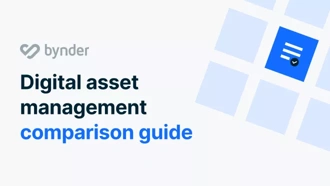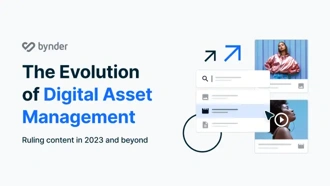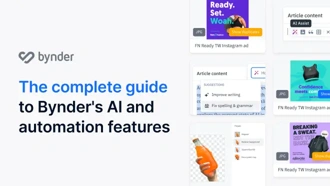What is file management?
File management is just what you think it is: managing files such as images, videos, documents, and everything in between. But there’s a lot to ‘managing’ files. This can be all activities relating to storing, organizing, and sharing content—which is something that is increasingly essential these days for both individuals and organizations. More reason to make sure that file managing is as efficient and fuss-free as possible.
There are many software solutions that can meet this need; the most popular and widely used file manager software is called digital asset management (aka DAM.) DAM’s primary focus is the effective management and organization of rich media assets (images, videos, and PDFs), emerging content formats (gifs, podcasts), as well as more standard file types (XLS and word docs) too.
What are the benefits of file management software?
The primary aim of file management software is to allow people to store and access the files they need as quickly as possible. As organizations grow and ultimately create more content, this can quickly turn to cluttered chaos if digital files aren’t managed correctly. Does it take you more than 10 seconds to find a file? If so, then it might be worth investing in a DAM solution.
Advanced file management software (like DAM) is all about maximizing the value of your content operations, with benefits including:
- Anytime, anywhere access to your files from a centralized portal
- File usage analytics to maximize content ROI and discover your winning assets
- Version functionality to ensure you always get your files in the correct size and format
- Simple and secure sharing of files both internally and externally
What’s the difference between file management software and digital asset management?
DAM ensures tighter control of file usage
As the number of users grow, you may want greater control over how specific users interact with your files. For instance, some files might be highly confidential, so access to those files needs to be restricted. Or maybe you are working with a freelancer, and access needs to be time-specific.
DAM automates manual tasks with AI functionality
More basic file management software usually requires you to manually categorize and apply metadata to digital assets. This can be very time-consuming to get right, so DAM solutions like Bynder automates metadata application, i.e. ‘tagging,’ when files are uploaded. Tags are applied based on the contents of an image, i.e. ‘dog’ tag for an image of a dog. This ensures easy searching for everyone in the long run.
DAM has advanced file management capabilities
DAM systems tend to have more advanced organizational functionality than basic file management systems. This could come in the form of automatic file tagging, filter file organization, derivatives, or versioning, to name a few. Basically, it’s functionality that is more suited to larger teams, i.e. enterprise companies, who are having to manage hundreds, if not thousands, of files at a time.
DAM has content usage analytics
Some of the more advanced DAM systems will be equipped with data analytics functionality. This gives users data-driven insights into file usage via visual charts and reports, so the ROI of content can be tracked, making it much easier to see what content is working and what’s not. Likewise, it can be used to identify how users are interacting (uploads, downloads, views etc.) within the DAM system for a better understanding of how users are leveraging the DAM.
DAM is customizable to boost user adoption
We get it: when you think ‘file management software’, it hardly gets the heart racing. That’s why DAM systems like Bynder allow you to customize the environment with your own branded ‘look and feel’ to make it a little more homey.
Frequently asked questions about file management software
How much does file management software cost?
Pricing for file management software/DAM is typically based on your specific needs, so it will depend on factors like the number of users, storage space needed, and integrations required. For a free no-obligation Bynder DAM quote, request pricing here.
How do I measure the ROI of file management?
ROI is connected to usage. With basic file management software, it can be difficult to identify which users are actually making use of the system. With some DAM systems, analytics functionality is included with the software, delivering the data to more accurately measure and report usage.
What kind of files can file management software store?
This will depend on the type of file management software you choose. Bynder DAM software supports almost any file type and even offers file previews of the most popular file formats.
Where can I try DAM or file management software?
For a free no-obligation DAM demo, click here. During the demo, one of our consultants will walk you through the features and functionality that may suit your specific needs, and answer any questions you may have.



